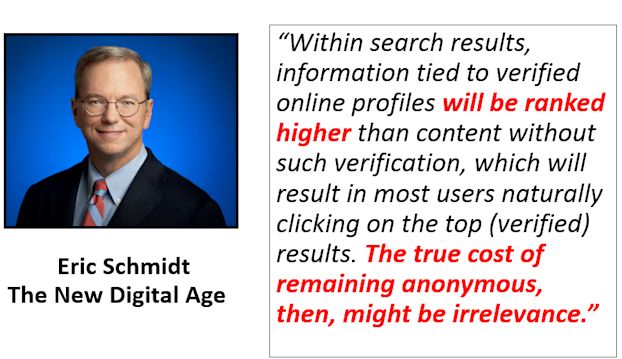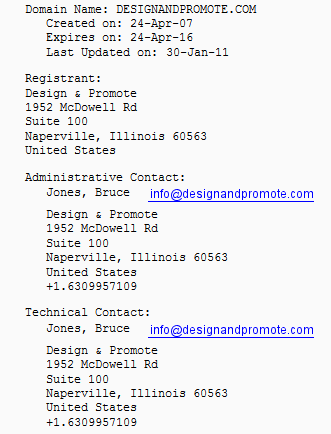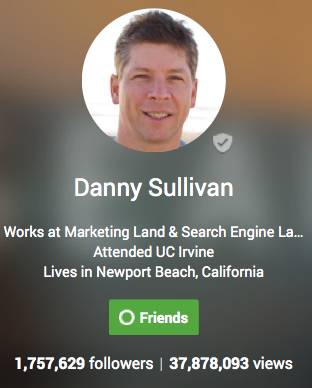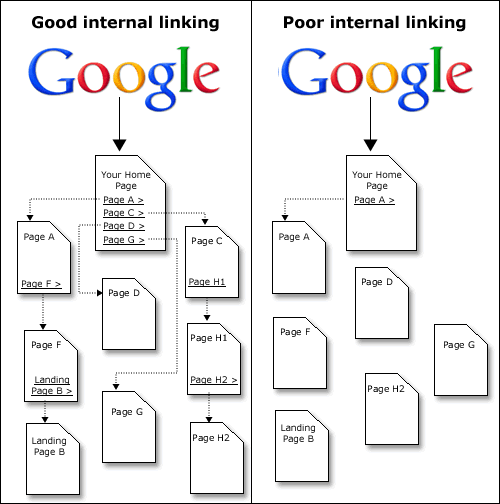Top 5 Easy Positive Signals to Send Google
Contents
Ranking in Google is all about sending as many positive signals as you can, while also avoiding negative signals. Here are the easiest positive signals you can broadcast to Google. Of course, building high quality links is the most effective thing you can do, but that involves quite a bit of work, right? Even if you do that, Google may find itself evaluating your new links, whether they are quality or spam. They will take into consideration many factors. The more quality signals you have, the higher chance they give benefit to your link building campaigns.
These positive signals are things that are 100% within your own control. These are all things you can do in 15 minutes or less. They give you the biggest bang for your time spent. Here are the top 10 quality ranking signals you can send to Google quickly.
Reveal Yourself
 Google’s Eric Schmidt was quoted in his 2013 book “The New Digital Age”:
Google’s Eric Schmidt was quoted in his 2013 book “The New Digital Age”:
“Within search results, information tied to verified online profiles will be ranked higher than content without such verification, which will result in most users naturally clicking on the top (verified) results. The true cost of remaining anonymous, then, might be irrelevance.”
The first step in avoiding irrelevance, due to being anonymous, is by removing your private whois.
 There is a very high correlation factor between a site having private whois, and ranking badly. According to Moz’s 2015 ranking factors, it’s a -.06 correlation between remaining anonymous and lower rankings. Whether you are using your actual name, or a “pen name”, create an identity for your blog. Enter that identity in the whois data for your domain, and remove the private whois. I like to take that name, and even the email and address, and stick it on an “about me” page. This is a positive signal that shouldn’t take more than a few minutes to change the registrant data, remove the whois protection, and less than 10 minutes to start a simple “about me” page on your site.
There is a very high correlation factor between a site having private whois, and ranking badly. According to Moz’s 2015 ranking factors, it’s a -.06 correlation between remaining anonymous and lower rankings. Whether you are using your actual name, or a “pen name”, create an identity for your blog. Enter that identity in the whois data for your domain, and remove the private whois. I like to take that name, and even the email and address, and stick it on an “about me” page. This is a positive signal that shouldn’t take more than a few minutes to change the registrant data, remove the whois protection, and less than 10 minutes to start a simple “about me” page on your site.
Begin Accruing Author Rank
 Here’s another quote from Google’s Eric Schmidt: “Your online identity in the future is unlikely to be a simple Facebook page; instead it will be a constellation of profiles, from every online activity, that will be verified and perhaps even regulated by the government.” Search Engine Land’s Danny Sullivan tries to spin this somewhat. He says
Here’s another quote from Google’s Eric Schmidt: “Your online identity in the future is unlikely to be a simple Facebook page; instead it will be a constellation of profiles, from every online activity, that will be verified and perhaps even regulated by the government.” Search Engine Land’s Danny Sullivan tries to spin this somewhat. He says
“it becomes clear that Schmidt isn’t talking about what Google is doing now nor even about what it might do with a Google+ account. He’s speculating on how governments themselves might change, and in turn, try to control information.”

The New Digital Age by Eric Schmidt
No, it’s not “clear”, at least not to me. Schmidt says “perhaps even regulated”. The word “perhaps” doesn’t make government intervention a prerequisite. Is Schmidt really saying “This is the digital future, but only if the US government forces all its citizens to verify their every social profile online”? That is likely will never happen (because of opposition, not because various autocrats wouldn’t desire it). You cannot assume that Google will only attribute author rank when the Government forces people to identify themselves, especially because Matt Cutts has said they’ve already begun using Author Rank (again, linking to Danny).
With the prior link being 2013, and the later link being 2014, I think it’s safe to say that there IS such a thing as author rank. And according to Eric Schmidt, it is attributed to a constellation of profiles, from every online activity. What should you do, to start your Author Rank?
Sign up to Google+, LinkedIn, Twitter and Facebook. If your site is heavy on images, also do Pinterest and InstaGram. On your “About Me” page that you created in step 1, link to each of these social accounts. From those social accounts, link back to your money site. If you’re diligent, and your “about me” page is already set up, you could sign up to all four and link them in less than 15 minutes.
Even if you have bare-bones social accounts tied to your money site, you’ve still done better than most of your competition. Slowly, over time, participate with these social accounts, for instance — each time you post an article. This is a form of link building, so it is worthwhile not only to build author rank, but also for getting links.
Balance Your Page’s Keywords
 Keyword stuffing is a bad signal that can prevent your page from even ranking in Google. If you have your site hooked up to Google analytics, one of the things I like to do is pull up the last week’s stats, for Google traffic. Then I’ll click on “landing page”. I’ll sort by which pages on your site received the least traffic. Something is preventing those pages at the bottom from ranking very well.
Keyword stuffing is a bad signal that can prevent your page from even ranking in Google. If you have your site hooked up to Google analytics, one of the things I like to do is pull up the last week’s stats, for Google traffic. Then I’ll click on “landing page”. I’ll sort by which pages on your site received the least traffic. Something is preventing those pages at the bottom from ranking very well.
Check your page’s keyword density at SEO Book. A one-word keyword should be around .8 to 1.1% keyword density. Two-word keywords from .7 to 1% density, and 3-word keywords between .5 and .7% density. If you notice that keywords are far above these ranges, that could very well be why your page is not ranking in Google.
If you’ve determined that keyword stuffing may be a reason your page isn’t ranking, simply reduce the number of times you use that keyword in your content. It only takes a couple minutes to check a page’s keyword density, and reduce it if you’re stuffing. The ROI based on the time you spend balancing keywords, and the ranking improvements you achieve, make this one of the fastest ways of sending a positive signal to Google.
Add a Paragraph of Content
When a page hasn’t changed in a very long time, Matt Cutts has referred to a “staleness” factor, where even an old site may get passed by newer sites. On the other hand, a page that has a fresh addition of content will be considered as current and relevant today. Adding content to a page sends a positive signal to Google that your site isn’t auto-generated, but that it is being curated and improved by a human being.
Use the same method of identifying under-performing pages referenced in point #3 above, and target these pages to receive an additional paragraph of content. You should be able to add a paragraph in less than 15 minutes, yet is very effective in improving rankings, which makes this a fast way of sending positive signals to Google.
Interlink Pages
 Once your site has achieved a certain ranking, you may find your page settle in the SERPs around a position that is hard to push up from. If you’ve balanced the keywords already, and added new content — yet the ranking still doesn’t improve, there is another quick and easy way to get that page ranking higher.
Once your site has achieved a certain ranking, you may find your page settle in the SERPs around a position that is hard to push up from. If you’ve balanced the keywords already, and added new content — yet the ranking still doesn’t improve, there is another quick and easy way to get that page ranking higher.
Simply find the most relevant pages to the page you wish to rank, and then build links to that page from those related pages. This inter-linking is probably the most effective way to quickly achieve better rankings. By improving the relations between your content, you send strong ranking signals that Google trusts (from your own site), more than they immediately trust external links. By building relevant links from within your site, you can improve your rankings in mere days, with less than 15 minutes of your time invested.
Do you know of a fast way to improve your rankings, that can be done in less than 15 minutes and makes a huge impact for your position in the SERPs? We would love to hear it in the discussion below. Thanks for reading and participating!

Comments